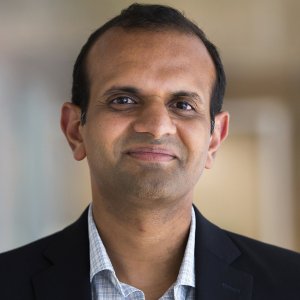Presented By: Aerospace Engineering
AE Chair's Distinguished Lecture: The Role of Computing in Shaping Propulsion Sciences
Venkat Raman, Professor, Aerospace Engineering, University of Michigan

Venkat Raman
Professor, Department of Aerospace Engineering
University of Michigan
Ever since the start of the microprocessor and high performance computing revolution more than four decades ago, supercomputing and computational propulsion have remained indistinguishable. The overall thinking was that scientific exploration is the path to economic prosperity, and applying the emerging high performance computing capability to a problem of national interest - aircraft propulsion - will provide an edge in an increasingly competitive environment. The relationship was strengthened when the US signed (but did not ratify) the comprehensive nuclear test ban treaty (CTBT). The methods and tools needed to ensure stockpile readiness could be directly tested using computational propulsion as a surrogate problem. Leading OEMs (P&W, GE, Rolls Royce) seized this opportunity, leading to transformative design processes, the impact of which is seen in the phenomenal advances in aircraft engine performance in the last three decades.
In the last decade, there has been a change in the governing philosophy for computing. It is now seen that computing should support industrial leadership, which is deemed the path for economic success. While this may seem abstract, the effect is that computing is seen as a way to accelerate decision making in the industrial context. Driven by Silicon Valley’s increasing dominance over the use of computations, emerging supercomputing architectures are geared towards processing large volumes of data. This has important implications for computational propulsion. For instance, the path towards computations-based certification of alternative fuels may no longer be possible. At the same time, new opportunities have emerged. This talk discusses the nuances of this new era of supercomputing and its role in computational sciences.
This talk is based on a recent article by the speaker: “Emerging Trends in Numerical Simulation of Combustion Systems”, Hassanaly and Raman, Proceedings of the Combustion Institute, Volume 37, Issue 2, 2019, Pages 2073-2089.
About the speaker...
Venkat Raman received his PhD from Iowa State University in 2003 in the department of chemical engineering. He was a NASA/Center for Turbulence Research Postdoctoral Fellow at Stanford University from 2003-2004, and a research associate in the Center for Integrated Turbulence Simulations from 2004-2005.
From 2005-2014, he was on the faculty of Aerospace Engineering and Engineering Mechanics Department at The University of Texas at Austin, initially as an assistant professor (2005-2011) and later as tenured associate professor (2011-2014).
Raman received an NSF CAREER award in 2008, a distinguished paper award at the International Combustion Symposium in 2013, and the Moncrief Grand Challenge Award in 2013. He held the Eli. H and Ramona Thornton Centennial Fellow in Engineering at UT Austin from 2013-2014.
Professor, Department of Aerospace Engineering
University of Michigan
Ever since the start of the microprocessor and high performance computing revolution more than four decades ago, supercomputing and computational propulsion have remained indistinguishable. The overall thinking was that scientific exploration is the path to economic prosperity, and applying the emerging high performance computing capability to a problem of national interest - aircraft propulsion - will provide an edge in an increasingly competitive environment. The relationship was strengthened when the US signed (but did not ratify) the comprehensive nuclear test ban treaty (CTBT). The methods and tools needed to ensure stockpile readiness could be directly tested using computational propulsion as a surrogate problem. Leading OEMs (P&W, GE, Rolls Royce) seized this opportunity, leading to transformative design processes, the impact of which is seen in the phenomenal advances in aircraft engine performance in the last three decades.
In the last decade, there has been a change in the governing philosophy for computing. It is now seen that computing should support industrial leadership, which is deemed the path for economic success. While this may seem abstract, the effect is that computing is seen as a way to accelerate decision making in the industrial context. Driven by Silicon Valley’s increasing dominance over the use of computations, emerging supercomputing architectures are geared towards processing large volumes of data. This has important implications for computational propulsion. For instance, the path towards computations-based certification of alternative fuels may no longer be possible. At the same time, new opportunities have emerged. This talk discusses the nuances of this new era of supercomputing and its role in computational sciences.
This talk is based on a recent article by the speaker: “Emerging Trends in Numerical Simulation of Combustion Systems”, Hassanaly and Raman, Proceedings of the Combustion Institute, Volume 37, Issue 2, 2019, Pages 2073-2089.
About the speaker...
Venkat Raman received his PhD from Iowa State University in 2003 in the department of chemical engineering. He was a NASA/Center for Turbulence Research Postdoctoral Fellow at Stanford University from 2003-2004, and a research associate in the Center for Integrated Turbulence Simulations from 2004-2005.
From 2005-2014, he was on the faculty of Aerospace Engineering and Engineering Mechanics Department at The University of Texas at Austin, initially as an assistant professor (2005-2011) and later as tenured associate professor (2011-2014).
Raman received an NSF CAREER award in 2008, a distinguished paper award at the International Combustion Symposium in 2013, and the Moncrief Grand Challenge Award in 2013. He held the Eli. H and Ramona Thornton Centennial Fellow in Engineering at UT Austin from 2013-2014.